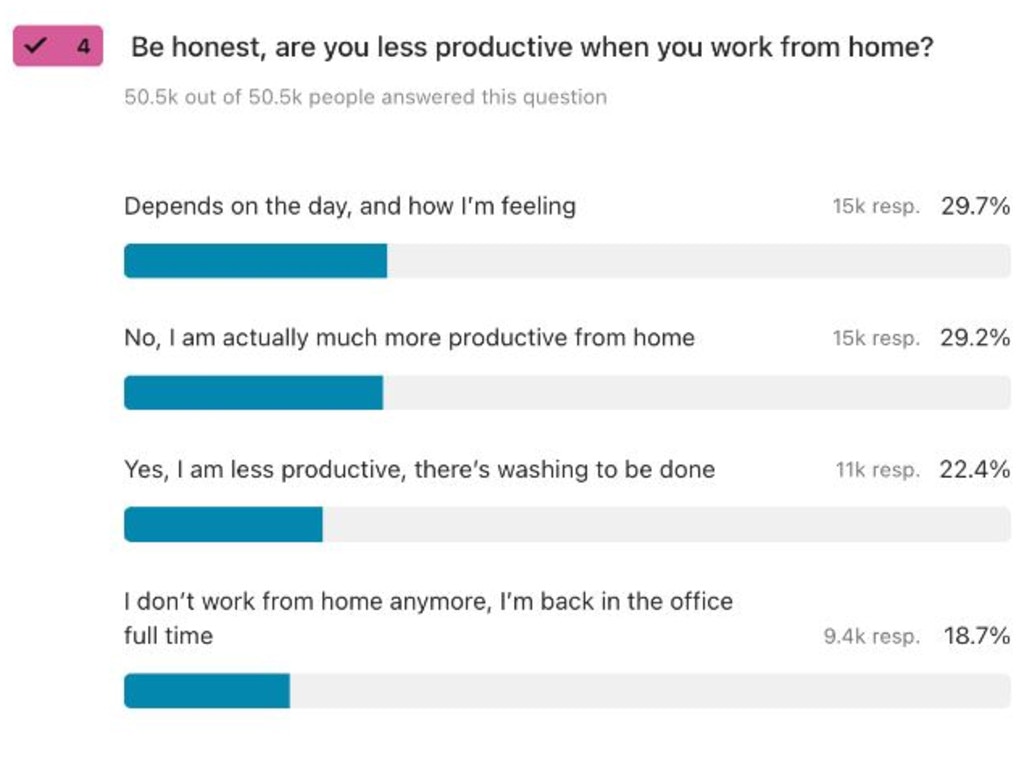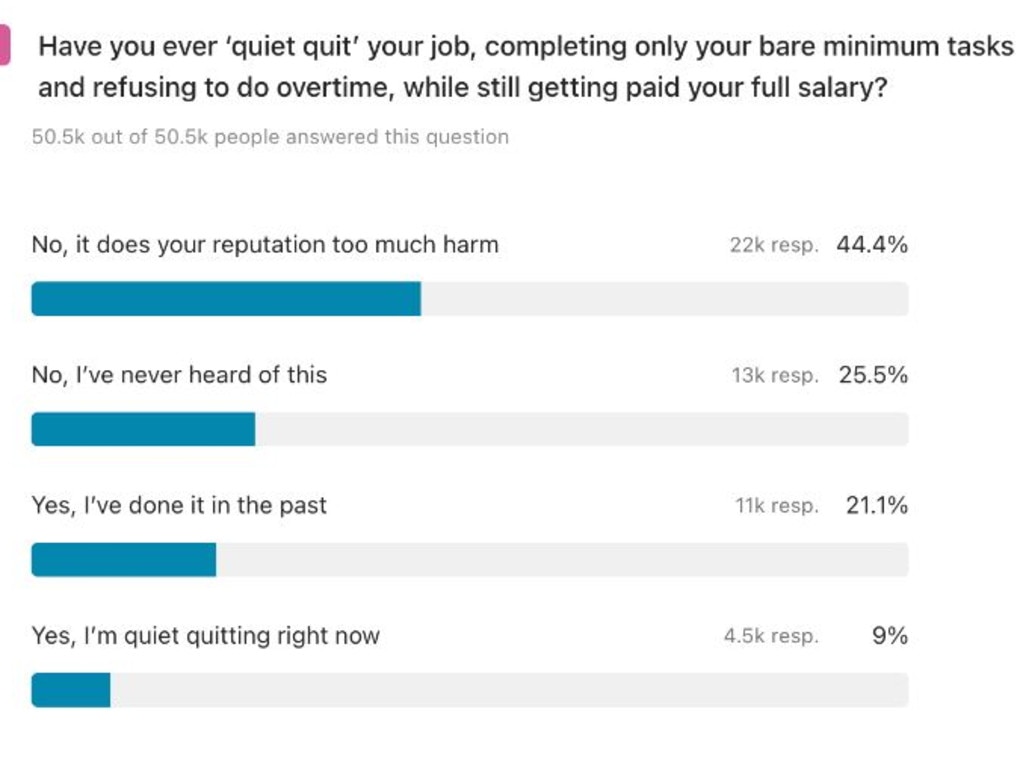Aussie employees reveal truth about working from home
The truth about working from home has finally been revealed, with 50,000 Aussies answering a major question that has been on every boss’ mind.
Whether you love it or hate it, there is no denying that working from home has become a key consideration for job hunters.
Having at least a few remote work days has almost become an expectation for many Aussie workers in a post-Covid world, with companies facing pushback from employees when trying to make them return to the office full time.
It is clear that Aussie workers value the flexibility that working from home offers, but are they really getting the same amount done as they would in the office?
More than 50,000 Australians recently participated in news.com.au’s Great Aussie Debate survey.
Participants answered 50 questions, revealing their opinions on everything from work and politics to using your phone on the loo and wearing shorts in the office.
One of the questions asked was whether participants were less productive when they worked from home.

The majority of Aussies, 29.7 per cent, said their productivity depended on how they were feeling on the day.
However, almost the same amount of respondents (29.2 per cent) claimed they were “much more productive” when working at home.
A smaller number of people, 22.4 per cent, admitted they were less productive, with things like washing needing to be done throughout the day.
Men were more likely than women to admit they were putting in less effort when working remotely, with people over the age of 60 most likely to select this option as well.
Young Aussies were most likely to say their productivity depended on the day and how they were feeling, while people in the 40-49 age range got the most work done while at home.

Natascia Spadavecchia, senior insights manager at HR, payroll, and employee engagement platform Employment Hero, said the Great Aussie Debate survey had revealed a “nuanced” picture of our remote working culture.
She said the difference between younger and older Aussies in their working from home answers could be put down to generational differences.
“Interestingly, younger employees’ daily moods largely influence their productivity working from home, while older workers admit they are less productive at home as a rule of thumb,” Ms Spadavecchia said.
“The latter stems from generational differences in adapting to digital technology, needing to become more familiar with remote working setups and styles, and reliance on physical-social interactions to motivate themselves at work. It’s fair to say younger employees are more in tune with socialising digitally.
“The former is reflective of the reality that employee productivity levels can fluctuate, whether that’s at home or in the office, which is why we’re seeing a rise in employers focusing on output and results and trusting their people versus monitoring exactly how or when employees are working day to day.”
She questioned why employees shouldn’t be able to manage their time in the best way they see fit if they are hitting all their targets, noting that having flexibility to reallocate certain tasks to a different time where workers may perform better should be seen as “a positive shift to better work outcomes”.
The survey also asked participants about quiet quitting, a workplace trend that has exploded in popularity this year.
It is essentially a rejection of the idea that work has to take over your life and that you, as an employee, should be going above and beyond in your role.
Instead, people following the trend are encouraged to do the bare minimum by only performing the duties outlined in their job description and politely declining to take on any more responsibilities outside of that or work longer hours than necessary.
However, it appears the majority of Aussies think jumping on the quiet quitting train is too risky, with 44.4 per cent saying they have never quiet quit and that it “does your reputation too much harm”.

However, there was still a significant amount of Aussies who admitted to doing it in the past, with 11,000 of the 50,000 respondents saying they had quiet quit before.
A further 4500 people revealed they were quiet quitting right now, while the other 25.5 per cent of respondents had never heard of the term.
The data revealed a cross over between the current quiet quitters and remote working, with the former more likely to admit they are less productive at home (32 per cent) than those who have never quiet quit (21 per cent).
Employees have been re-evaluating their priorities in recent years, with Ms Spadavecchia telling news.com.au this means an increasing number of people are putting in more boundaries between their work and personal life.
“Putting boundaries around work ensures tasks are completed but don’t fully encroach into employees’ home or personal lives, leading to burnout,” she said.
“People are more productive when they are well-rested and can take a break and recharge by doing the things they love.”
She said that if employees are quiet quitting because their job satisfaction has dropped off then it is essential for a conversation to be opened up between the worker and employer.
“Be honest with yourself and your workplace about where you’re in your career, what is working for you, and what is not,” Ms Spadavecchia said.
“Suppose you’re not challenged or feel your skill development or career trajectory has stalled. In that case, you may be surprised at what an easy fix these things are if you start with a professional but candid conversation with your manager or employer.”








